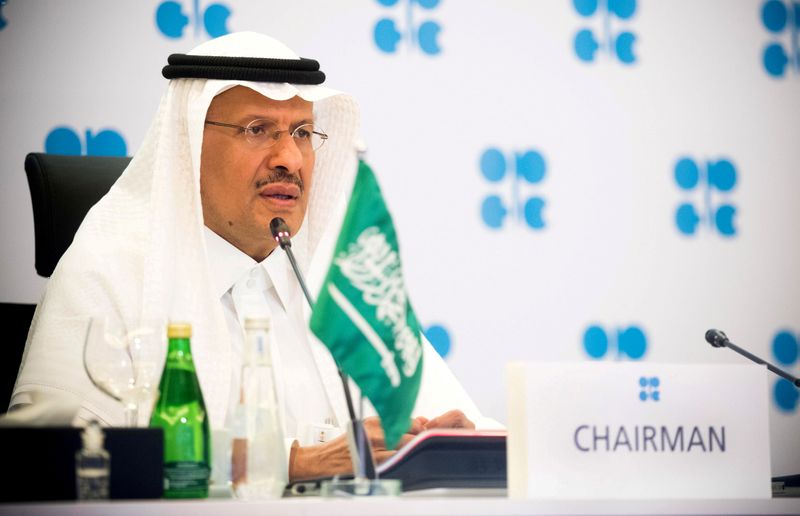By Marwa Rashad and Ghaida Ghantous
DUBAI (Reuters) -Saudi Arabia's energy minister pushed back on Sunday against opposition by fellow Gulf producer the United Arab Emirates to a proposed OPEC+ deal and called for "compromise and rationality" to secure agreement when the group reconvenes on Monday.
It was a rare public spat between allies whose national interests have increasingly diverged, spilling over into OPEC+ policy setting at a time consumers want more crude to aid a global recovery from the COVID-19 pandemic.
OPEC+, which groups the Organization of the Petroleum Exporting Countries and its allies, voted on Friday to raise output by some 2 million barrels per day from August to December 2021 and to extend remaining cuts to the end of 2022, but UAE objections prevented agreement, sources had said.
"The extension is the basis and not a secondary issue," Saudi Energy Minister Prince Abdulaziz bin Salman told Saudi-owned Al Arabiya television channel.
"You have to balance addressing the current market situation with maintaining the ability to react to future developments ... if everyone wants to raise production then there has to be an extension," he said, noting uncertainty about the course of the pandemic and output from Iran and Venezuela.
The UAE said on Sunday it backs an output increase from August but suggested deferring to another meeting the decision on extending the supply pact. It said baseline production references - the level from which any cuts are calculated - should be reviewed for any extension.
The standoff could delay plans to pump more oil through to the end of the year to cool oil prices.
"Big efforts were made over the past 14 months that provided fantastic results and it would be a shame not to maintain those achievements. ... Some compromise and some rationality is what will save us," the Saudi energy minister said.
"We are looking for a way to balance the interests of producer and consumer countries and for market stability in general, especially when shortages are expected due to the decrease in stockpiles," he added.
Responding to oil demand destruction caused by the COVID-19 pandemic, OPEC+ agreed last year to cut output by almost 10 million bpd from May 2020, with plans to phase out the curbs by the end of April 2022. Cuts now stand at about 5.8 million bpd.
OPEC+ sources said the UAE contended its baseline was originally set too low, but was ready to tolerate if the deal ended in April 2022. The UAE has ambitious production plans and has invested billions of dollars to boost capacity.
Prince Abdulaziz, who stressed Riyadh's "sacrifice" in making voluntary cuts, said no country should use a single month as a baseline reference, adding there was a mechanism to file objections and that "selectivity is difficult".
The regional alliance that saw Saudi Arabia and the UAE join forces to project power in the Middle East and beyond -- coordinating use of financial clout and, in Yemen, military force -- has loosened as national interests came to the fore.

Abu Dhabi extricated itself from the Yemen war in 2019, saddling Riyadh. Saudi Arabia this year took the lead to end a row with Qatar despite reluctance from its Arab allies.
The kingdom has also moved to challenge the UAE's dominance as the region's business and tourism hub as Riyadh vies for foreign capital to diversify its economy away from oil.